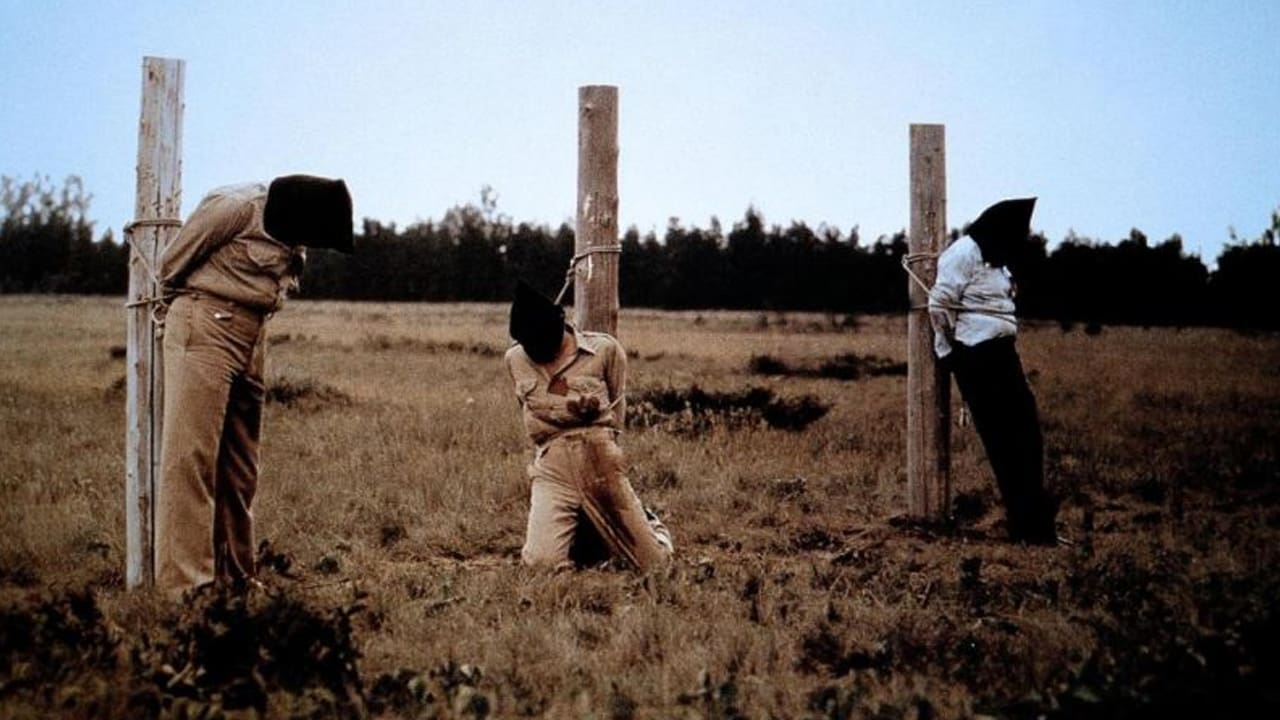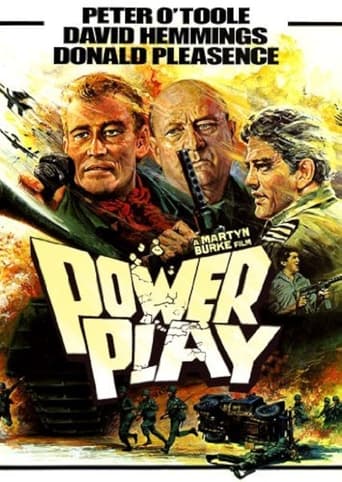



An action-packed slog
Although it has its amusing moments, in eneral the plot does not convince.
View MoreThe thing I enjoyed most about the film is the fact that it doesn't shy away from being a super-sized-cliche;
View MoreIt's a good bad... and worth a popcorn matinée. While it's easy to lament what could have been...
View MoreIn this no doubt peculiar film that has a rather dated patina and production values that wouldn't bear scrutiny in today's world of slick multimillion endeavours however drove away at me and ended up surprising my, admittedly reduced expectations. There's a professional cast pulling out the stops to keep it going, and the way the story ended up left quite a visceral punch - even though the screenplay rather gives it away in the opening sequence in a chat show reminiscence by a witness, back in the real world, ie New York.I like odd movies like this for the curveballs they can throw like the really confusing setting imagined for this country in convulsions. Where somewhere in Eastern Europe do all the military speak in rich English accents or American drawl and the character names seem so anglo-saxon? Where are there big sea freighters unloading British rail rolling stock? The little bit of folk music might have Balkan origin but where in Yogoslavia do they have so many sand dunes for the tank sequences? The 'terrorists' look like the young German Red Brigade or even Irish lackeys. The bit the few reviews can't fail to pick up is the faintly absurd torture of a young woman with electrodes attached to her nipples dispassionately supervised by the Blofelt-type Donald Pleasance (who is good here).All the funny external elements are redeemed however I think by the seriousness of the whole thing and the repeated riff on home truths like perfectly understandable duplicity and cyclic violence that all such Coup-d'etat and by implication all revolutions can involve -despite best efforts from even good chaps. O'Tool's speech at the end about change and society is so deeply ironic and scary - be very scared of change old boy - a very British movie indeed.
View More"Power Play" is rare example of a film with an entirely fictional plot but based on a non-fiction book, in this case "Coup d'État: A Practical Handbook" by Edward N. Luttwak. The action takes place in an unnamed, fictitious Western European country. The events of the plot bear a certain resemblance to real-life events which took place in Portugal in 1975, three years before the film was made, but the film-makers seemed to have wanted to avoid identification with any specific country. The names of the characters are taken from various languages- German (Zeller, Stauffenberg), French (Rousseau), Spanish (Barrientos), Russian (Kirov) and Arabic (Anwar), even English (Blair). The country's flag, seen displayed prominently in many scenes, is green, yellow and black- colours probably chosen because no actual European country uses this particular combination.Like Portugal in 1975, this country is a civilian dictatorship with an oppressive, corrupt and authoritarian government. Resistance to the regime is growing not only among the general population- there have been numerous acts of armed resistance, including the kidnapping and murder of a cabinet minister- but also among the armed forces who are unhappy at being asked to repress their own people in the interests of the unelected politicians. A small group of military officers, led by Colonel Anthony Narriman, decide that they must lead a coup to overthrow the regime and restore democracy.Most of the film is taken up with details of preparations for the coup. The plotters come close to discovery on a number of occasions by the regime's intelligence service. One of the group is a heavy drinker and the others worry that he might blurt out their secret while in his cups. They succeed in recruiting Colonel Zeller, the commander of a tank regiment, to their cause, knowing that they will need his tanks to take the capital, but worry if he is a man they can trust. The closest they come to disaster is when they attempt to recruit another regimental commander only to find he is 100% loyal to the government, and have to take immediate action to prevent him from betraying them. The film is able to generate a good deal of tension, justifying its "thriller" label, until the appointed day arrives and the conspirators are able to send their tanks onto the streets to reclaim their country for democracy. There is, however, to be a surprising denouement.The film, officially a British-Canadian co-production, stars some of the leading lights of the British cinema from the seventies, including Peter O'Toole as the enigmatic Zeller, David Hemmings as the idealistic Narriman and Donald Pleasence as Blair, the sinister head of the secret police. (No jokes please. The film was made long before Britain had a Prime Minister with that particular surname). All of them play their roles well, but the film seems to have largely vanished from sight in recent years. (I recently caught a rare screening on London Live, a TV channel which seems to specialise in reviving forgotten British films from the seventies, eighties and nineties).I think that the reason why the film has faded is that it no longer seems as topical as it once did. In the Cold War years of the seventies military coups were a frequent occurrence in various parts of the world, including Europe. Not long after the film was made there was to be an unsuccessful coup in Spain and a successful one in Poland when the military under General Jaruzelski succeeded (with the connivance of the Soviet Union) in removing the country's civilian Communist leadership from power. Today, fortunately, they are less common than they once were, even in Latin America, and virtually unthinkable anywhere in Europe. The result is that, although "Power Play" is a reasonably well-made action-thriller, it does not speak to the world of 2017 in the way that it might have spoken to the world of 1978. 6/10
View MoreThis almost unknown movie remains one of my favourites. David Hemmings plays Colonel Narriman, a charismatic infantry colonel in a small viciously repressive country. For years he's tried to keep out of "politics" and ignore the horrors around him but finally he can't take it any more and is pursuaded to lead a military coup. To ensure success he reluctantly accepts the help of the officer in charge of the country's tanks, Colonel Zellar (played by Peter O'Toole). Their main enemy is the head of the secret police, a character with the hilarious name of BLAIR, played brilliantly by Donald Pleasence. I love the way this movie explores Narriman's mental anguish as conscience gradually overtakes duty and it racks up the tension wonderfully as the coup is planned and eventually carried out. I'm not giving the 'twist' away but rest assured the scene where Narriman finally realises he's been used is as good as you'll ever see. This is a genuinely scary film and perfectly portrays life in a country where the law is whatever the president says it is. Don't miss it!
View MoreWhen I first saw this movie about ten years ago, I was blown away by it. On subsequent viewings, its flaws have become more apparent -- most of the characters are flatly written, a few of the minor roles are poorly played. However, the film still remains a worthy effort. Whereas most political films only pay lip service to ideological concerns, Power Play actually attempts to examine both what it means to live in a totalitarian regime and how easily the best intentions can be subverted. The film has a fine lead performance from David Hemmings. While he at first seems to be flamboyantly overacting, Peter O'Toole eventually reveals the chilling truth behind his character's manner. Lastly, Donald Pleasence plays the head of the Secret Police but, as opposed to later performances, doesn't descend into camp and is a frightfully Himmleresque figure. The scenes where he tortures a young woman are disturbing and, thankfully, played for outrage than for exploitation. Powerplay features a downbeat ending but in the end, its the only honest way the film could end. Check it out if you get a chance.
View More